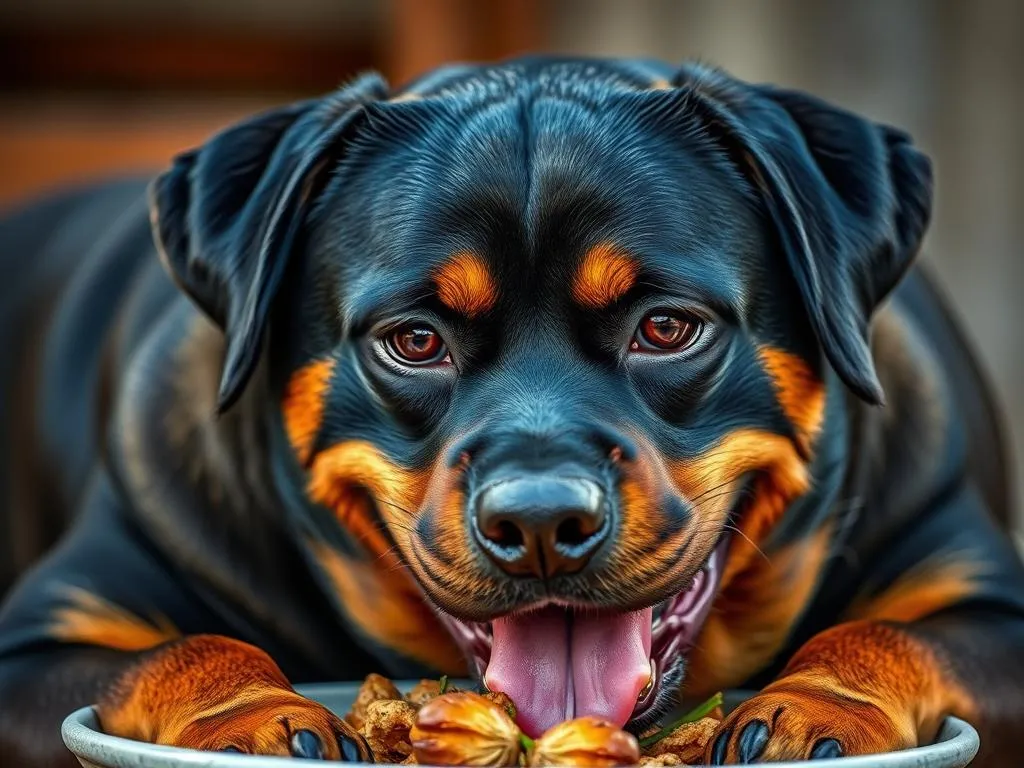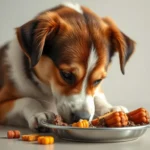
Introduction
Proper nutrition is crucial for the health and well-being of dogs, and Rottweilers, known for their strength and loyalty, have unique dietary needs that must be met. To ensure these dogs thrive, it’s essential to understand what Rottweilers eat and how their nutritional requirements differ from those of other breeds. This article will explore the breed characteristics, nutritional needs, types of dog food available, feeding guidelines, and special dietary considerations for Rottweilers.
Understanding Rottweilers
Breed Characteristics
Rottweilers have a rich history, originally bred in Germany to drive cattle and pull carts. Their strong build and protective instincts make them outstanding companions and guard dogs. Adult Rottweilers typically weigh between 80 to 135 pounds, and their height ranges from 22 to 27 inches. This breed is muscular and robust, but they are also prone to certain health issues that can be influenced by their diet.
Common Health Issues
Rottweilers are susceptible to health problems such as hip dysplasia, heart conditions, and obesity. Obesity is particularly concerning, as it can exacerbate joint issues and decrease overall quality of life. A tailored diet can play a crucial role in preventing these health issues, making it imperative for Rottweiler owners to understand what Rottweilers eat and how it impacts their health.
Nutritional Needs of Rottweilers
Macronutrients
To maintain optimal health, Rottweilers require a balanced intake of macronutrients: proteins, fats, and carbohydrates.
- Proteins: Essential for muscle development and repair, Rottweilers need a diet rich in high-quality protein. Approximately 22-32% of their diet should consist of protein.
- Fats: Fats provide energy and support skin and coat health. Rottweilers should receive about 8-15% of their daily caloric intake from healthy fats.
- Carbohydrates: While not strictly essential, carbohydrates can provide energy and support digestive health. About 30-50% of their diet can include carbohydrates, preferably from whole grains and vegetables.
Micronutrients
Vitamins and minerals are vital for Rottweilers’ overall health. Key micronutrients include:
- Calcium: Important for bone health, especially in growing puppies.
- Omega-3 Fatty Acids: Support skin health and reduce inflammation.
- Vitamins A, E, and B-complex: Essential for immune function, skin health, and energy metabolism.
Rottweilers require a balanced intake of these nutrients to thrive, so understanding what Rottweilers eat is critical for ensuring their dietary needs are met.
Types of Dog Food
Dry Kibble
Dry kibble is one of the most popular feeding options for Rottweilers. It is convenient, affordable, and can help keep teeth clean due to its crunchiness. When choosing kibble, look for brands that list meat as the first ingredient and avoid those with fillers like corn or soy. Some recommended brands for Rottweilers include:
- Royal Canin Rottweiler Adult
- Hill’s Science Diet Adult Large Breed
- Orijen Original Dry Dog Food
Wet Food
Wet food can be beneficial for Rottweilers, especially those who may struggle with hydration or have dental issues. It is palatable and often more appealing to picky eaters. However, wet food can be more expensive and may not provide the same dental benefits as dry kibble. Some recommended brands include:
- Blue Buffalo Homestyle Recipe
- Purina Pro Plan Savor Adult
- Wellness CORE Grain-Free
Raw Diet
The raw food diet, often referred to as BARF (Biologically Appropriate Raw Food), involves feeding raw meat, bones, fruits, and vegetables. Proponents claim it leads to better coat health and improved digestion. However, raw diets can pose risks, such as bacterial contamination and unbalanced nutrition. If considering a raw diet for your Rottweiler, consult with a veterinarian to ensure it’s appropriate.
Homemade Diet
Preparing homemade meals for Rottweilers can be rewarding, but it requires careful planning. Essential ingredients to include are:
- Lean meats (chicken, beef, turkey)
- Vegetables (carrots, peas, sweet potatoes)
- Whole grains (brown rice, quinoa)
- Healthy fats (fish oil, flaxseed oil)
Avoid toxic ingredients such as chocolate, onions, garlic, and grapes. It’s crucial to maintain a balanced diet and consult with a vet for guidance when preparing homemade meals.
Feeding Guidelines
Age and Life Stage Considerations
Rottweilers have different nutritional needs at various life stages:
- Puppies: Require higher protein and fat levels (about 22-32% protein and 8-15% fat) for growth.
- Adults: Should maintain a balanced diet with moderate protein and fat levels.
- Seniors: May benefit from a diet lower in calories and fat to prevent obesity, while still getting adequate protein for muscle maintenance.
Portion Control and Feeding Frequency
Portion control is essential for preventing obesity. A general guideline is to feed adult Rottweilers 2-3% of their body weight daily, split into two meals. For example, a 100-pound Rottweiler would need about 2-3 cups of food per day, depending on their activity level.
Treats and Snacks
Treats can be a great way to reinforce training but should be given in moderation. Healthy options include:
- Carrot sticks
- Apple slices (without seeds)
- Commercial dog treats made with natural ingredients
Aim to keep treats to less than 10% of their daily caloric intake to avoid overfeeding.
Special Dietary Considerations
Allergies and Food Sensitivities
Rottweilers can develop food allergies, commonly to proteins such as chicken, beef, or dairy. Symptoms may include itching, gastrointestinal issues, or ear infections. If you suspect your Rottweiler has a food allergy, consult your veterinarian for proper diagnosis and management.
Weight Management
Maintaining a healthy weight is critical for Rottweilers, as obesity can lead to serious health issues. Regular exercise, such as daily walks or playtime, combined with a balanced diet, is essential. Monitor your dog’s weight and adjust food portions accordingly.
Signs of Poor Nutrition
Signs that your Rottweiler may not be receiving adequate nutrition include:
- Dull coat or excessive shedding
- Poor muscle tone or lethargy
- Frequent gastrointestinal issues
- Weight loss or obesity
Regularly monitor your Rottweiler’s health and consult with a veterinarian if you notice any concerning symptoms.
Consulting with a Veterinarian
Working with a veterinarian is vital for ensuring your Rottweiler’s nutritional needs are met. They can provide personalized recommendations based on your dog’s age, weight, activity level, and health status. Don’t hesitate to ask questions regarding specific dietary needs or concerns about food allergies or sensitivities.
Conclusion
Understanding what Rottweilers eat is fundamental to their overall health and well-being. By focusing on balanced nutrition tailored to their specific needs, owners can help prevent health issues and promote a happy, active life for their Rottweilers. Prioritize quality nutrition, consult with professionals, and keep your furry friend thriving!









